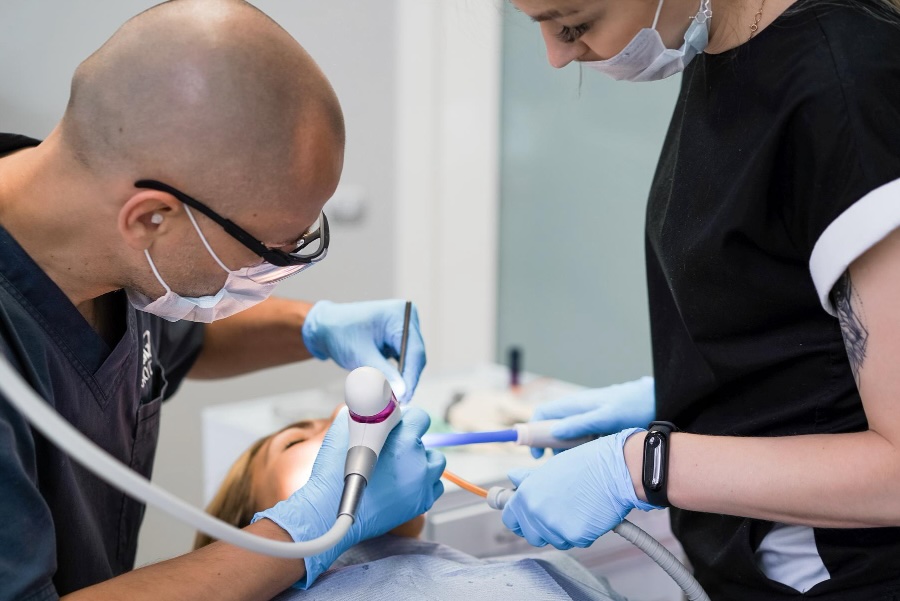The wisdom teeth, or your third molars, are the last teeth to come out of the mouth. Around your late teens or early twenties, they will erupt at the far back of your mouth, right next to your second molars. Some wisdom teeth will come out flawlessly and in alignment with other teeth. But most of the time, the wisdom teeth can pose problems. If you’re curious about timing, learn more about when wisdom teeth come in.
Because they emerge at a later age, the wisdom tooth usually no longer has enough space. So, they tend to be impacted or they come in at an angle – whether against the adjacent tooth or towards the cheek. An impacted wisdom tooth can be problematic because it can cause pain, discomfort when eating, tooth decay, and wisdom tooth infection.
Learn more about impacted wisdom teeth, its symptoms, possible complications, the treatment options you can consider, and everything else in between.
Understanding Impacted Wisdom Teeth
At a certain age, the wisdom teeth should start coming out at the furthest back position of your mouth. There are four wisdom teeth – one on each corner of the mouth. Sometimes, they grow in without being noticed. But most of the time, they can cause quite a problem. If you’re weighing your options, here’s whether all wisdom teeth have to be removed.
An impacted wisdom tooth occurs when the mouth does not have enough space for the tooth to come out. Depending on how much of the tooth is covered in bone, a tooth impaction can be:
- Partial impaction occurs when some parts of the tooth are exposed, while the rest remain underneath the bone. Partially impacted wisdom teeth are usually angled diagonally against the next tooth or gum. They are prone to cause infection or decay because they are difficult to clean.
- Complete impaction is when the entire tooth is embedded in the jawbone, whether vertically, horizontally, or even diagonally. An X-ray is required to determine the exact position of the tooth.

Symptoms of Impacted Wisdom Tooth
If you suspect that you have an impacted wisdom tooth, here are some key symptoms that you may experience:
- Pain and discomfort
- Swelling of the gums or jaw
- Difficulty opening the mouth or eating
- Bad breath
- Headaches or earaches
However, it is important to know that not all impacted wisdom teeth come with symptoms. This is why routine dental check-ups are important. If your dentist sees that the wisdom tooth can potentially cause dental issues, they can recommend preventive removal so you do not have to worry about them in the future.
Complications of Impacted Wisdom Teeth
If left untreated, an impacted wisdom tooth can cause:
- Tooth decay
If an angled wisdom tooth continues to push against the tooth next to it, decay will eventually occur. Also, bacteria and food can get trapped easily between these teeth. This increases the risk of cavities if not properly cleaned.
- Gum disease
Food and bacteria underneath the gum flap of an impacted wisdom tooth can cause gum disease. The gum will feel tender and can make biting or chewing uncomfortable.
- Infections and abscesses
A severely decayed or damaged wisdom tooth will eventually lead to infection if left to progress. Symptoms such as cheek swelling and difficulty opening the mouth may be signs that the problem is getting worse.
- Cysts and tumors
In some rare cases, a cyst may develop around an impacted wisdom tooth. The cause is usually unknown and they can be hard to spot unless an X-ray is taken. So, regular check-ups are important just to make sure that you remain problem-free.

Treatment Options for Impacted Wisdom Teeth
-
- Observation and Monitoring
If your wisdom tooth is functionally erupted with no symptoms and you can properly clean and maintain it, our team will not recommend removal. However, regular visits will be required to monitor any changes in the wisdom tooth. This will help our team assess if you will eventually need a new treatment plan to manage your wisdom tooth. - Surgical Extraction
However, when the wisdom tooth becomes a problem or is likely to become one, removing it is the only solution. At Sierra Dental, we have an experienced team of dental surgeons and staff to ensure a safe and smooth wisdom tooth removal experience.
- Observation and Monitoring
The process generally goes like this:
- First, we check the placement and shape of your tooth using X-rays and scans.
- Then, anaesthesia is administered so you can relax before and during your treatment. Anaesthesia for surgery can be through local anaesthetics, laughing gas, or sedation.
- Once the anaesthetic has taken effect, the tooth will be removed. Depending on the level of impaction, some gum or bone be removed for better access to the tooth.
- The wound is then closed using sutures. And, once sedation has worn off, you will be provided with aftercare instructions for your recovery.
Post-Surgical Instructions
It is normal to experience minimal bleeding, minor pain and discomfort, and swelling after your wisdom tooth removal. Swelling will peak after 3 days and should subside as the days go by. Healing improvements will gradually occur day by day. With good care, you should be able to go back to your usual tasks after 3 days.
Here are some tips to improve wound healing and accelerate your recovery time:
- Rest and allow your body to recover. Avoid strenuous activities such as heavy lifting and exercises.
- Take the prescribed pain relievers to manage pain and discomfort.
- Apply cold compress where necessary to alleviate swelling.
- Stick with a liquid and soft diet for 3 days following surgery. You can slowly transition to semi-solid food as your healing improves and the wound closes.
- Maintain a healthy and balanced diet. Protein is a good nutrition source as this is known to help with wound healing.
- Practice good oral hygiene. Rinse using an antiseptic mouthwash or mild saltwater to clean the wound.
- Avoid smoking and alcohol as this can compromise your progress.
Key Takeaways – Impacted Wisdom Teeth
Not everyone gets all their wisdom teeth and not all wisdom teeth will cause problems. If there is enough space in the mouth, the wisdom teeth will come out normally. However, if these teeth are causing problems or are likely to down the road, it is best to have them removed.
Our team at Sierra Dental can help assess whether a wisdom tooth removal is best. Contact us today to book your appointment. We’ll get you started on a full assessment, and then discuss the proper treatment plan for you.